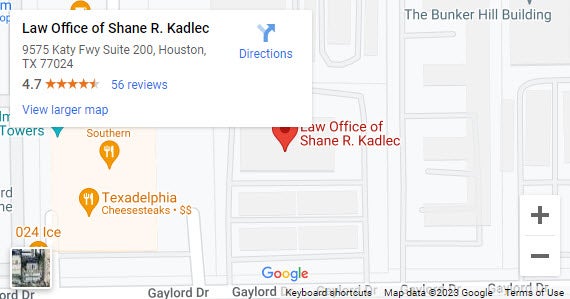Longshoreman and Harbor Injuries
Longshoreman Accident Lawyer in Houston, TX
When workers are injured on the job in Texas, they often do not have the guaranteed safety net of workers' compensation benefits. Our state is one of the few that does not make it mandatory for employers to carry such insurance. However, Texas maritime workers employed in the state have rights to recover money under Federal Law following work accidents, including the ability to seek recovery through the Longshore and Harbor Workers' Compensation Act (LHWCA) or Jones Act. With this in mind, the Law Office of Shane R. Kadlec is ready and willing to help those who have been hurt while performing maritime-related duties.
What Benefits Are Available for People Injured in Texas Dockside Accidents?
The Law Office of Shane R. Kadlec is committed to supporting individuals injured in Texas dockside accidents. Working in the maritime industry, particularly as a longshoreman or harbor worker, involves unique risks and challenges. When accidents occur, it's essential to understand the benefits available under the law. Our team is dedicated to helping you navigate these complex legal waters, ensuring you receive the full range of benefits and compensation you are entitled to for your injuries.
Damages Available To Injured Longshoreman
What is the difference in Status Test & Situs Test?
Status Test: The legal landscape for longshoreman injury claims is framed by two critical concepts: the Status Test and the Situs Test. The Status Test pertains to the nature of the worker's employment. To qualify for certain benefits, such as those under the Longshore and Harbor Workers' Compensation Act (LHWCA), an individual must be engaged in maritime employment. This includes, but is not limited to, longshore work, ship-repairing, shipbuilding, or ship-breaking.
Stitus Test: The Situs Test, on the other hand, relates to the location of the work. Under the LHWCA, the injured worker must have been employed on, near, or adjacent to navigable water. This includes piers, docks, wharves, terminals, or other areas customarily used in the loading, unloading, repairing, or building of a vessel. Understanding these tests is crucial in determining eligibility for maritime injury benefits and is a key area where a knowledgeable attorney can provide invaluable guidance.
Types of Texas Longshoreman Injuries/Accidents
How Can A Harris County Longshoreman Attorney Help Me?
Navigating the aftermath of a longshoreman or harbor injury requires not just legal expertise, but a deep understanding of the maritime industry and its specific challenges. At the Law Office of Shane R. Kadlec, we bring this specialized knowledge to every case. Our first step is a comprehensive assessment of your situation, considering the unique circumstances of your accident and the applicable laws. We then work to secure the full range of benefits and compensation you're entitled to, whether through workers' compensation claims, federal maritime laws, or other relevant avenues.
Our approach is not just about legal representation; it's about advocacy and support. We understand the physical, emotional, and financial impact these injuries can have, and we're dedicated to guiding you through each step of the process. From gathering evidence and negotiating with insurance companies to representing you in court if necessary, our goal is to ensure that your rights are protected and your voice is heard. With the Law Office of Shane R. Kadlec at your side, you can focus on your recovery, knowing that your case is in capable hands.
How to Qualify For Benefits
Maritime workers must show that they are eligible for coverage by proving "status" and "situs." The status aspect requires that employees perform at least some maritime work. While this obviously includes longshore workers and ship repairers, others whose jobs do not require them to constantly be on the ship or at the harbor may also receive benefits, including those who drive trucks carrying shipping containers.
We Help Texas Workers Get Past Their Injuries
The situs portion of the qualifying test requires maritime workers to prove that their job requires them to work on, near or adjacent to navigable water. This means that even employees who never set foot on a ship may qualify. There is no hard and fast rule for what "near" or "adjacent" mean, but most courts take it to mean that the claimant must work within a mile of these waters.
Let An Experienced Maritime Accident Attorney Help
A knowledgeable work accident lawyer in Houston can advise you regarding this complicated issue. If you've been hurt on the job, a skilled attorney with the Law Office of Shane R. Kadlec in Houston can help. Call 281-962-8949 or contact us online to schedule a free consultation. We represent injured maritime workers throughout the Texas Gulf Coast region, including in Harris County and Galveston County.
Contact Us For A Free Consultation
Work with an attorney with a proven record of success. To begin crafting your personal injury case, contact our Houston office online or call us at Free Consultation 281-962-8949.
We offer free personal injury consultations, and most cases are handled on a contingency fee basis. Under this fee structure, you would not owe us attorney fees unless we recovered compensation on your behalf.

